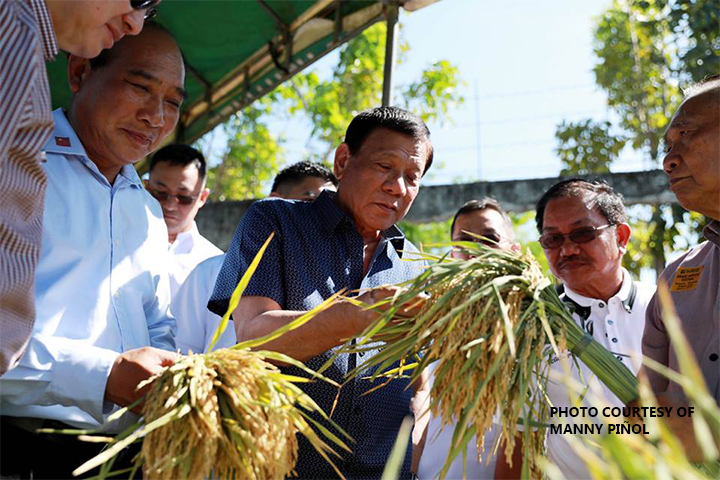News
DA eyes satellite rice production in PNG

SATELLITE PRODUCTION. Agriculture Secretary Emmanuel Piñol (2nd from right) said Malacañang had approved his travel to Papua New Guinea soon for a bilateral deal allowing Filipinos to grow rice in PNG and supply the staple back here. (PNA File Photo)
MANILA — The Philippine government is aiming to clinch a deal with Papua New Guinea (PNG) for Filipinos to be able to grow rice there and supply the staple back here.
Agriculture Secretary Emmanuel Piñol said in a media conference in Quezon City on Wednesday that Malacañang had given its thumbs up for his travel to PNG soon, so he and authorities there can finalize the arrangements.
“The idea is for the Philippine government to enter into a bilateral agreement with PNG on the matter,” he told reporters, saying the planned satellite rice production could boost the availability of affordable rice for Filipinos.
If plans push through, he said Filipinos would be able to grow rice in satellite farms in PNG, initially supplying the grains there while that country is developing its rice industry. The excess produce would then be shipped to the Philippines.
Earlier, Piñol said he presented to Malacañang such concept of rice production outsourcing, so Filipino entrepreneurs abroad can help grow and ensure supply of this staple grain.
Latest data indicate the Philippines is heading towards rice sufficiency by 2020, he said.
Ballooning population and decreasing agricultural land in the country highlight the need for finding rice production alternatives like outsourcing in satellite farms abroad, the agriculture chief noted.
Piñol is optimistic about the outsourcing prospect with PNG, noting the country of about 8 million people has a total land area of around 46 million hectares.
Australia has ongoing agricultural activities in about 400 hectares there, he said.
The Philippines’ initial five-year target to develop one million hectares of PNG land for rice can produce around 8 million metric tons (MT) annually – more than enough to meet PNG’s rice need of only about 200,000 MT.
At present, PNG sources its rice overseas and has sought the Philippines’ help in developing its rice industry, according to Piñol.
Filipino-produced inbound rice shipments from PNG would boost the availability of rice in the Philippines, Piñol said.
“Those shipments will be treated as imports that may enter the country as National Food Authority (NFA) rice,” he said.
NFA sells its rice at prices lower than commercial rice.
Recently, however, NFA said its stocks are running low already.
The agency aims to increase its stocks with rice imports totaling some 250,000 MT this year. (PNA)





















